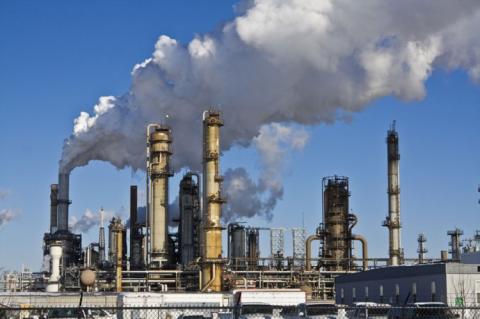<figure class="wp-block-table"><table><tbody><tr><td></td></tr></tbody></table></figure>
<p>Just how much do oil refiners make in California? Only the owners of the five refineries in the state know. They control 96% of gasoline made in California, according to the California Energy Commission. </p>
<p>But every driver in the state may soon be able to find out how much refineries are making if Senate Bill 1322, the California Oil Refinery Cost Disclosure Act, gains traction in Sacramento. </p>
<p>California State Senator Ben Allen (D-Los Angeles) says SB 1322 would require the refineries to report their profits every month from each gallon they sell. Its time for transparency, he says, because “costs at the pump in California are inflated compared to neighboring states” but it’s a “big black hole when it comes to data with relation to the oil and gas industry, how they price gas at the pump.”</p>
<p>It’s worth noting that a state investigation into gas pricing found in October 2019 that retailers in California were charging more than other states for gasoline. </p>
<p>A request by Governor Newsom for the Attorney General’s Office to investigate the issue has resulted in no action by that office. As the report noted, the cost of gas in this state is unregulated and its whatever consumers are willing to pay.</p>
<p>Joining the Senator at a Friday press conference is long-time consumer activist Jamie Court, President of Consumer WatchDog. </p>
<p>“California has been an ATM for oil refiners for too long” says Court, “the pain at the pump is real. When truck drivers have to fill up at 5-7 dollars a gallon we all pay more for the goods they are carrying to stores”. </p>
<p>Court says consumers should know that the fossil fuel industry in California “isn’t paying what they say they are paying” for gas and “it’s time to pull the curtain back.”</p>
<p>The Western States Petroleum Association has faced off with Court and his organization before. </p>
<p>Kevin Slagle, speaking for the Association, dismisses Watchdog claims as “theatrics” and says the major reason for the cost of “the gas at the pump is the cost of the crude.” As for what the future holds, Slater says “experts recognize that unforeseen events – as we are seeing in Ukraine and around the world today – can have significant impacts.”</p>
<p>Court says the reality of the California market is all smoke and mirrors.</p>
<p>“Everytime crude oil costs go up, gas prices go up, but oil companies don’t buy crude oil that day or they don’t buy it on the spot market, they buy crude oil it on long term contracts, they are paying a lot less then what the world price is now.” </p>
<p>Contracts have a nine year maximum term and, according to commodities market, you can buy oil for delivery in 2031 at $50.34 a barrel, far less than today’s price.</p>
<p>The “big five” oil refinery companies are Chevron, Marathon, PBF Energy, Phillips 66 and Valero. </p>
<p>The Watchdog organization says the refineries sell gasoline to their own branded outlets for more money, 30 to 40 cents a gallon above the price they sell the same gas to Costco and United Oil. That extra profit tacked onto their own retailers is all profit, says Court.</p>
<p>Slagle, with the Petroleum Association, blames California regulations and taxes.</p>
<p>“California’s mandated fuel blend requirements, increasingly high state taxes, and regulations such as cap-and-trade and the Low Carbon Fuel Standard impact” the price, Slagle said. The Association website says it represents the companies doing the bulk of petroleum “exploration, production, refining, transportation and marketing” in California, Arizona, Oregon, Hawaii, Nevada, and Washington”</p>
<p>Jenn Engstrom, the director of CAL-PIRG, a consumer advocacy group, said at the conference that “oil companies will blame (increased costs) on environmental protection” but it’s only a small part of costs Californians pay at the pump. Engstrom says “especially now when there is so much fluctuation with gas prices, it’s important we have better transparency so we can call out oil refineries if they needlessly raise prices”.</p>
<p>Senator Allen, the bill’s author, concluded by saying that “We ask the oil companies on behalf of California drivers: Let’s end the games of smoke and mirrors. Open your books and show the public your true costs of doing business,” the Senator said.</p>
<p>The bill moves to Senate’s Committee on Energy, Utilities and Communications which is chaired by San Diego Senator Ben Hueso. No hearing date has been set.</p>
<p>.</p>
